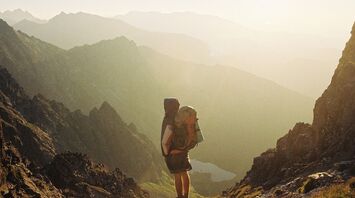How to choose the right gear for a mountain hike: expert recommendations

Tourists who go on a trip to the mountains are advised to take a responsible approach to packing for a hike. The main rule is not to pack too much but to take only the necessary things that you may need during your trip.
Among the most necessary things are waterproof hiking shoes, preferably with high ankles to avoid injury. Make sure they are also waterproof, as you may be walking in different climates and terrain, and before buying them, try walking in them for a while to check the comfort level, writes News Bytes.
Find out in advance the weather conditions at your hiking destination and buy a suitable jacket. It is always advisable to wear a down jacket for subzero temperatures and a raincoat to protect yourself from a sudden downpour. Be sure to pack them in the front pockets of your backpack for easy access during emergencies.
Woolen gloves and a warm scarf will help you keep warm in cold weather. When you are in a sleeping bag, the scarf can serve as a pillow, providing warmth to your head while you sleep. You can also buy snow gloves if it's a winter hike.
Don't forget to bring sunglasses with you, especially when snow hiking, as you may experience snow blindness. In addition, they protect your eyes from the intense sunlight of the mountains. It is equally important to carry a trekking pole for a comfortable hike. You can buy one or two poles, depending on the terrain and routes you are traveling.
It's important to remember that after sunset, hikers have to rely on headlamps for all activities, even to use the restroom, as there will be no electricity in the area you are traveling. Enjoy the added benefit of hands-free convenience.
Take enough water with you on your hike to avoid dehydration. Along with water, don't forget to bring toilet paper, facial tissues, moisturizers, travel shampoo, soap paper/hand sanitizer, sunscreen with SPF 30+, lip balm with SPF 30+, a few plastic bags, and a dental care kit.
And finally, don't forget that foods like nuts (almonds, walnuts, or peanuts), energy bars, and mini chocolates can be ideal snacks during the hike to keep your energy levels up. Along with your regular medications, be sure to bring Diamox (for altitude sickness), blister patches, painkillers (especially for altitude-induced headaches), and tablets for diarrhea, colds, fever, and cough.
If you're not interested in traveling to the mountains, we recommend an interesting option - underwater hotels. TravelWise published a list of the 7 best locations to watch marine life.



















